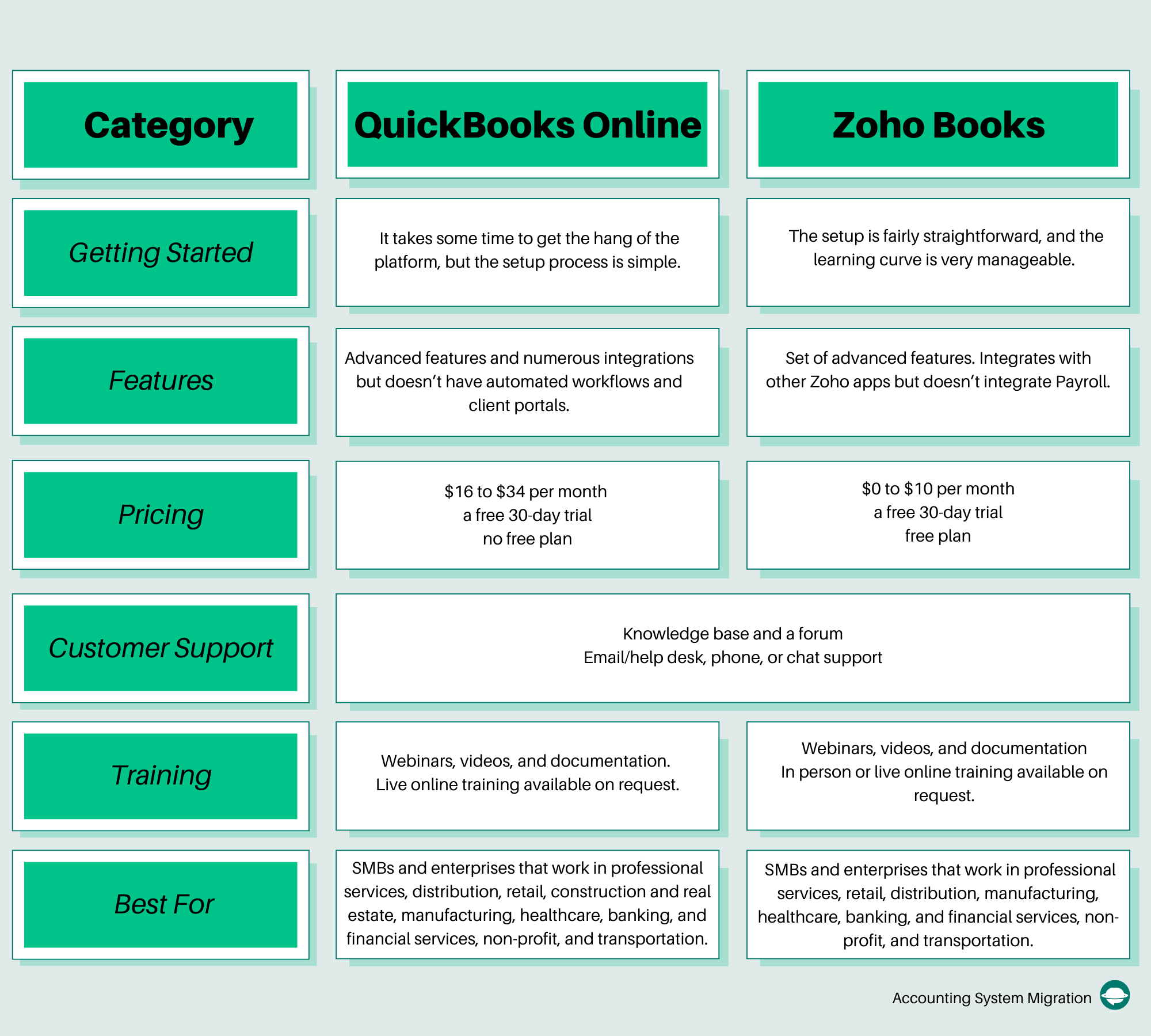A question of the day: Which one is better - Zoho Books vs QuickBooks Online? No fast answer here. But read on the comparison to make a well-searched choice.
The appropriate business accounting software makes your life easier. But its choice of the right bookkeeper tools is a challenging task. Zoho Books and QuickBooks Online are among the most popular solutions. Thus, you can narrow your search down to these two options and analyze their key differences.
To help you make a decision, we have created the particular Zoho Books vs QuickBooks Online guide. That explores critical features of both software providers and defines how they will assist in your business.
When it comes to comparing QuickBooks Online vs Zoho Books, it is worth indicating that both accounting systems are cloud-based. They are hosted online, and you can access them from anywhere if you have internet access. The two platforms provide the toolbox for managing their accounting and invoicing operations.
Let's go into the comparison of QuickBooks Online vs Zoho Books to help you choose the most suitable one.
Zoho Books vs QuickBooks Online: Are They Good?
Like any other business-specific software: QuickBooks Online and Zoho Books have similar features. However, compared to Zoho Books payroll, QuickBooks provides an integrated payroll widely used in all 50 states.
QuickBooks Online provides some features that you can use in Zoho Books only after purchasing a third-party integration. For instance, you can file sales tax returns or generate 1099s.
What Are the Main Features of Zoho Books?
Easy setup. The accounting tool offers onboarding which facilitates getting used to a new system and proceed with configuring their personal and understanding how to use Zoho Books correctly. There's a basic functionality set, including invoices and expenses. Other modules, such as inventory, purchase orders, or timesheets, can be chosen for further activations.
Comprehensive UI. Zoho Books offers a clean interface. Its left vertical pane contains navigation links to functional areas: Banking Time Tracking, Accountant, Reports, and others. Besides, Zoho's navigation and data entry are helpful due to combining buttons, drop-down lists, and checkboxes.
Detailed records. Contact manager in Zoho Books allows you to collect detailed client information. That includes contact details, including numbers and graphs. They may be related to receivables and payables, income, and expenses.
Transaction forms. Comparing Zoho Books vs QuickBooks, the first one provides more transaction types with flexible forms. Apart from the standard sales forms, Zoho Books involves retainer invoices and delivery notes. For instance, invoices include fields for shipping charges and adjustments, discounts and sales taxes, purchase transactions, including expenses, purchase orders, and the like.
Projects and timesheets. Once integrated with Zoho Projects, you can run projects. Each will have a home page where you can add work hours and analyze purchases and sales lists. Besides, Zoho Books always links tasks on the timesheet to clients and projects.
QuickBooks Online: What Features You Can Get?
Easy-to-onboard UX. QuickBooks Online represents different types of content, such as graphs for invoice and expense status. Also, it provides visuals that correspond to profit, loss, sales totals, and account balances. Using icons in the upper right, you can open multiple additional tools: search, help, or account information.
Sales and expenses. If you click on the All Sales icon, your screen will display a relevant multicolored bar. The particular bar provides you with instant data regarding the current status of the accounts receivable. Also, it shows you the number of pending estimates you have issued and the total dollar amount. What about the expenses area - it performs similarly, though it refers to different transactions such as purchase orders or bills.
Detailed records. Your accountants create numerous records that contain information about clients, vendors, products, or services. With QuickBooks Online, you access such records when creating transactions and reports. Besides the contact details, client record templates involve tabbed sections for different notes, tax data, or other custom data. When a record is completed, you will see the all entered information on a homepage.
Reports. QuickBooks Online offers numerous report templates that are quite flexible to adjustments. These standard ones include sales and clients, expenses and vendors, or accountant reports. Also, you can save your customized reports into a list of relevant custom reports.
Zoho Books vs QuickBooks: What Pricing Fits Your Budget?
QuickBooks Online and Zoho Books provide a monthly charged subscription per user seats. So the final price depends on the number of your users.
When comparing Zoho to QuickBooks, the second option is more expensive. Another setback: QuickBooks Online has no free plan. For instance, QuickBooks Online Plus, the most popular edition, costs $80 while Zoho Books Professional plan is $50 for five users. So let’s analyze the pricing of the two accounting solutions in a bit more details.
How Much Does Zoho Books Cost?
Zoho Books provides customers with three pricing plans that also offer a 14-day trial for the chosen one. All plans include different numbers of users, starting from one to ten, and various features. Besides, each subscription model offers a different number of permitted invoices. So how much does Zoho cost?
- Zoho Books Free: $0 per 1 user only
- Zoho Books Standard: $20 per company per month (includes 3 users)
- Zoho Books Professional: $50 per company per month (includes 5 users)
- Zoho Books Premium: $70 per company per month (includes 10 users)
In addition, Zoho Books allows adding multiple organizations to one account. For instance, if you own several unrelated businesses, you can add them as separate organizations. The only thing you have to do is switch between organizations.
There may also be several add-ons available for all subscription plans, starting from the Standard Plan:
- Additional users: $3 per user each month
- Branches: $12 per branch each month
- Advanced auto-scans: $10 per 50 scans each month
- Snail mail credits: you can provide clients with hard copies of required estimates and invoices, paying $2 per credit
How Much Does QuickBooks Charge per Month?
QuickBooks Online offers five pricing plans that also involve a different number of users and incredibly various features. Below, you can find specific peculiarities of each subscription model:
- Self-employed: $15 per month (involves 1 user)
- Simple start: $25 per month (involves 1 user)
- Essentials: $50 per month (involves 2 users)
- Plus: $80 per month (involves 5 users)
- Advanced: $180 per month (involves 25 users)
Moreover, QuickBooks Online provides a chosen subscription model with a 30-day free trial. You can select a 50% off monthly subscription for the first three months. Unlike the Zoho Books pricing model, QuickBooks Online offers no annual subscription.
Zoho Books vs QuickBooks: Pros and Cons Check up

Zoho Books
Benefits
Small businesses will find Zoho Books very attractive due to its affordability and accounting task automation. It helps focus on critical business operations: convert estimates and sales into retainers and recurring invoices, schedule customers billing, and send payment reminders.
Another feature to be appreciated is the Zoho Books client portal. It adds up to the collaboration opportunities inside and outside your company.
Zoho Books has comprehensive system configuration and further usage, and it continues to be significantly powerful and comprehensive. Using this tool allows accessing real-time information and analytics, which is critical for making informed decisions. Meanwhile, its features and pricing model make it a perfect option for startups and multiple small businesses. Therefore, if your company belongs to relevant categories, Zoho Books will be worth a close look.
Drawbacks
Of course, Zoho Books provides small businesses with many functionalities at an affordable price. However, there are some things you need to consider before subscribing. For instance, larger small businesses must be aware that Zoho Books offers a cap of 5,000 transactions per month. And this proposal is predicted by the highest plan.
When it is enough for many small companies, you should remember about this limit if your organization is growing quickly.
The particular tool may support numerous businesses using a single account. However, each organization requires paying a separate subscription fee.
QuickBooks Online
Strong side
QuickBooks Online attractive option due to its feature set that includes record-keeping, reporting, inventory management, tracking inventory, cost of items, and setting up low stock alerts, and others. Compared to Zoho Books, Quickbooks provides thorough, detailed records.
Numerous app integrations cover more than 600 apps. It includes different third-party tools, along with QuickBooks add-ons. They provide extended functionality and help reduce duplicating tasks across platforms.
There will be no trouble when accessing resources regarding QuickBooks Online. For example, when you cooperate with accountants, you can share the required information with them by sending invites via email. Also, since QuickBooks serves as the industry standard, you can find relevant experts easily.
Weak side
You will pay for QuickBooks Simple Start $25 per month. Compared to Zoho, QuickBooks integration involves only one account user and offers no time tracking or inventory management features. To obtain such features, you need to upgrade to higher plans, which can be quite costly. Ultimately, other competitors can provide plans that have similar functionalities at lower monthly fees.
Some find QuickBooks' learning curve as a disadvantage. If you already have some fundamental knowledge of accounting operations, there won't be any trouble. If not, it will take some time to get aboard.
How to Migrate Your Accounting Data: Zoho Books vs QuickBooks Online?
When comparing QuickBooks vs Zoho Books, you should remember that both are well-performing accounting tools for SMBs. Therefore, the perfect option for you will depend on your budget, intention to cooperate with external accountants, and business requirements.
QuickBooks Online is suitable for companies that can afford it and want to work with external accountants. Such cooperation may involve preparing their tax return. Besides being easy to use with numerous integrations, QuickBooks Online provides an immense network of certified ProAdvisors.
On the other hand, Zoho Books fits organizations that desire to purchase a suite of Zoho apps. Such apps can provide more than just accounting functions. Also, Zoho is better than QuickBooks Online in terms of pricing. Zoho accounting software is cheaper, which allows purchasing the whole number of Zoho apps. Meanwhile, the same cost you will pay for QuickBooks Online.
If you have made your choice, then our Accounting System Migration Checklist will come in handy.
Want to migrate to Zoho Books or QuickBooks Online?
Let's migrate accounting data together!



